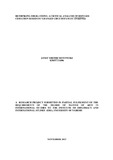| dc.contributor.author | Munywoki, Janet M | |
| dc.date.accessioned | 2013-11-21T07:54:18Z | |
| dc.date.available | 2013-11-21T07:54:18Z | |
| dc.date.issued | 2013-11 | |
| dc.identifier.citation | A Research Project Submitted In Partial Fulfilment Of The Requirements Of The Degree Of Master Of Arts In International Studies To The Institute Of Diplomacy And International Studies (idis), University Of Nairobi | en |
| dc.identifier.uri | http://erepository.uonbi.ac.ke:8080/xmlui/handle/123456789/59705 | |
| dc.description.abstract | This study explores State obligations in the application of the cessation of refugee status based on ‘changed circumstances’. The study is inspired by three (3) growing concerns amongst refugees, States, United Nations, scholars in refugee studies and stakeholders namely; intensified debates by States questioning their obligations under the refugee cessation clause based on ‘changed circumstances’; the increased call by States through tripartite agreements for precipitated repatriation of refugees vis a vis the low turn-out of refugees willing to repatriate; and the growing jurisprudence challenging the application and modalities in implementing the cessation clause based on ‘changed circumstances’. Using Kenya as a case study, the study examines the reception, refugee status determination process and management of refugees. The study affirms that though repatriation based on ‘changed circumstances’ in the country of origin is the best durable solution for refugees, measuring whether the changes are fundamental, durable and sustainable is often a difficult balancing act for States and the United Nations Commissioner for Refugees. In addition and due to the strict application of the Non refoulment principle, States sovereignty is threatened by the growing numbers of revoked refugees and asylum seekers. The study established that States re-organization has resulted in the adoption of new approaches in tackling forced migration by addressing social imbalances responsible for forced migration. The study finds that States review of their obligations under the refugee cessation clause based on ‘changed circumstances’ are well intended and calls for concerted efforts from the United Nations and all Stakeholders. The study recommends two (2) areas in the need for further scholarly research namely; on the adopted Common Asylum Procedures and their contribution in refugee burden sharing; and on the right to asylum for rejected refugees and asylum seekers. | en |
| dc.language.iso | en | en |
| dc.publisher | University of Nairobi | en |
| dc.title | Rethinking Obligations: A Critical Analysis Of Refugee Cessation Based On ‘changed Circumstances’ In Kenya | en |
| dc.type | Thesis | en |
| local.publisher | Institute of Diplomacy and International Studies | en |


